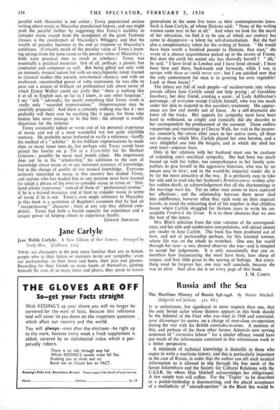Jane Carlyle
Jane Welsh Carlyle. A New Edition of Her Letters. Arranged by Trudy Bliss. (Gollancz.ass.) THERE are characters in the past more familiar than any in fiction, people who in their letters or memoirs invite our sympathy—even our partisanship—in their loves and hates, their joys and glooms. Recording for their friends so many facets of themselves, glinting beneath the suns of so many times and places, they speak to future generations in the same live tones as their contemporaries knew. Such is Jane Carlyle, of whom Dickens said: "None of the writing women came near to her at all." And when we look for the secret of her attraction, we find it to be one of which our century has come to disapprove—a talent for self-dramatisation. But she had also a complementary talent for the writing of fiction. "He would have been worth a hundred pounds to Dickens, that man," she wrote of a chance acquaintance picked up in the streets of Frome. But does she catch his accent any less shrewdly herself ? " Ah," he said, "I have lived in London and I have lived abroad ; I have been here and there, backwards and forwards, while I was in service with them as could never rest ; but I am satisfied now that the only contentment for man is in growing his own vegetable! Look at them beans! "
The letters are full of such people—of maidservants into whose private affairs Jane Carlyle could not help prying ; of Geraldine Jewsbury, her dear friend, creating a scene ; of Lady Ashburton's patronage ; of everyone except Carlyle himself, who was too much under her skin to respond to this novelist's treatment. His appear- ances are few and mostly out of focus. As a self-dramatist she knew all the tricks. Her appeals for sympathy must have been hard to withstand, so crisply and ironically did she describe to her correspondent the predicament of the moment. Those endless repaperings and repaintings at Cheyne Walk, her visit to the income- tax assessor's, the return after years to her native town, all these are dramas in which Mrs. Carlyle played her own heroine, and a very delightful one into ttke bargain, and in which she shed her own- tears—copious tears.
Only in her relations with her husband must one be cautious of extending one's uncritical sympathy. She had been too much bound up with her father, too comprehensive in her family sym- pathies, to give herself to the aggressive historian, who was by no means easy to love ; and to the would-be impartial reader she is by far the more attractive of the two. It is perilously easy to take her side and to read into her husband's Reminiscences, written after her sudden death, an acknowledgement that all the shortcomings in the marriage were his. Yet no other man seems to have captured her affections ; and the relationship between them never died into indifference, however often they each went on their separate travels, to avoid the exhausting duel of life together in that childless house where Carlyle struggled for thirteen years to write his un- readable Frederick the Great. It is to these absences that we owe the best of the letters.
Mrs. Bliss's selection from the nine volumes of the correspond- ence, and her able and unobtrusive interpolations, will attract almost any reader to Jane Carlyle. The book has been produced out of love, and out of partisanship perhaps, for this talented woman, whose life was on the whole so wretched. One sees her world through her eyes—a very shrewd observer she was—and is tempted to accept her judgements. It is only occasionally that one re- members how disconcerting she must have been, how sharp of tongue, and how little given to the sparing of feelings. But every- thing must be forgiven her, one may well conclude, because she was so alive. And alive she is on every page of this book.
J. M. COHEN.


































 Previous page
Previous page